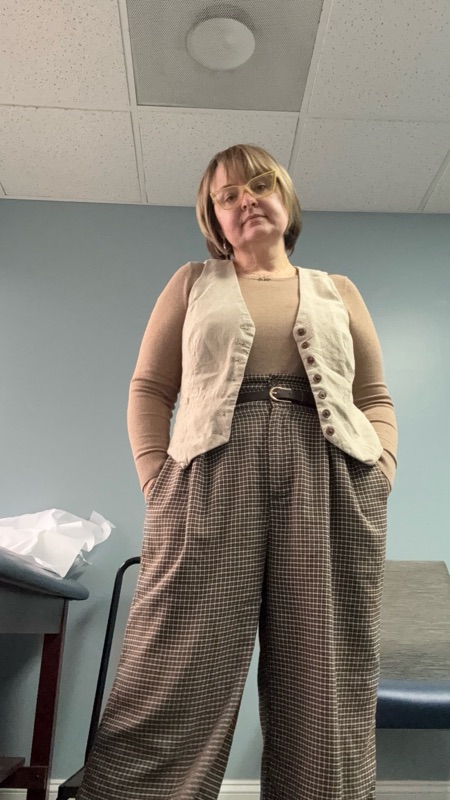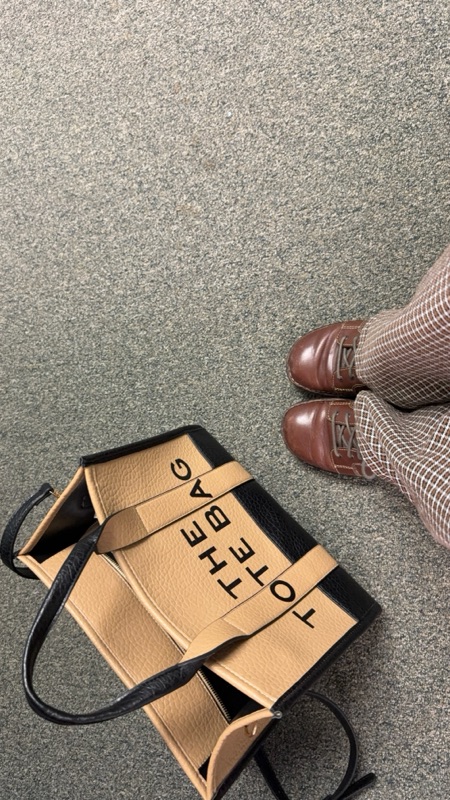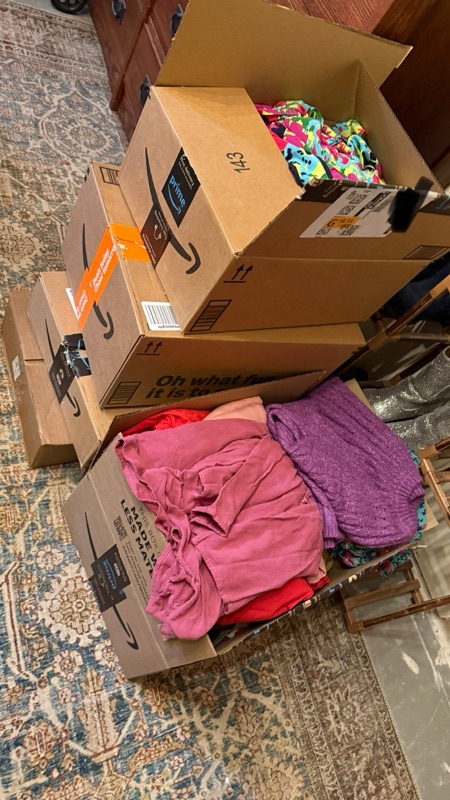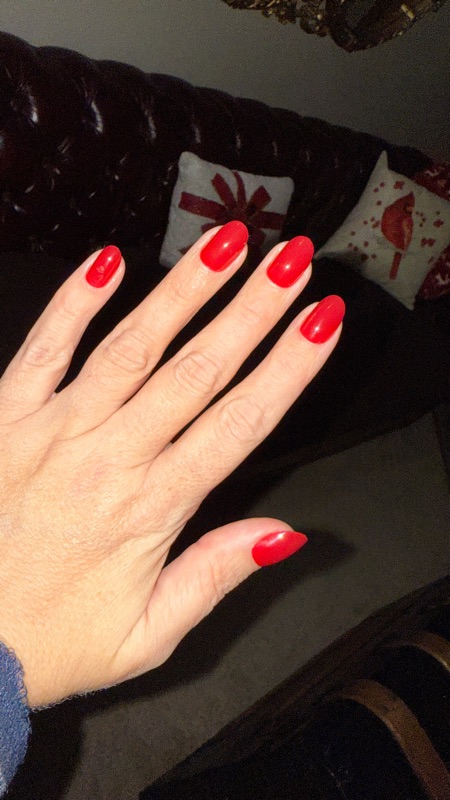This is my 40 pound weight loss with lipedema.
This is from is Jan 2021 at 215lbs.

These are from Jan 2025 at about 175lbs.

As you can see, not a lot about my legs has changed. That is because I have lipedema. Lipedema is a genetic disease of the fat tissue, and as such can be considered a loose connective tissue disease.
It is primarily found in the legs, but sometimes in the butt, arms and abdomen. Rarely in the chin/neck area. I am affected in the legs, butt, and arms, which makes me a type 3/4.

Fun fact: lipedema fat is more buoyant than regular fat, so I always need extra weights when scuba diving.
You do not have to be overweight or unfit to have lipedema. My legs were this general shape when I was a 110 pound teenager, incredibly fit from doing drum corps. My legs were still this general shape when I was 25 years old, 130 pounds, and working out daily in the military.
The pain can kick in at any point. It is often triggered by hormonal changes like puberty, pregnancy, peri/menopause. I was fairly pain free until my 40s.
Managing your weight can help but I know people who have pain free lipedema at a size 24 and people who are in incredible amounts of pain at a size 6. Pain and size don’t always correlate.
Men can have lipedema but it is less common to have issues because testosterone reduces the stretchiness of connective tissues. Some people transitioning female to male have had a significant reduction in lipedema pain after going on testosterone. (At one point I was in so much pain that I considered testosterone. “Babe, would you still love me if my voice was deeper than yours?  " )
" )
Lipedema makes your fat turn fibrous. Fibrous fat cannot be lost/shrunk like healthy fat. The fibrous fat is often painful, often inflamed, and interferes with circulation of lymph fluid.

It also is associated with a higher rate of knee replacements, due to the fat band that can overhang the knee and cause a lot of strain. Obviously this all impacts mobility.
Some people actually get eating disorders from trying to lose their “lippy fat”, often when they don’t have a diagnosis and think their body is their personal failure. This is why awareness matters.
The ONLY way for fibrotic fat to exit the body is by specialized lymph sparing liposuction … that insurance hates to cover.
Some people can’t even get approved for surgery because of BMI limits, when having lipedema obviously skews that number.
There are maybe a dozen US surgeons who specialize in this, so they can charge whatever they want. The Florida surgeon I would like charges over 30k per surgery.
Each surgeon or surgical facility also has a limit for how much they are willing to remove in one surgery.
I know people who have had up to six lipedema removal surgeries.
A lot of people then need skin reduction surgery after recovering from the lipedema removal surgery.
Many people go to Germany, Spain, or Greece for more affordable/experienced care, and for surgeons who will accept higher BMI, or take out a higher volume in each surgery.
Some people experience regrowth after even multiple surgeries. That said, the overall statistics for the surgical solution reflects good stability over many years.
Personally, I don’t even want to have surgery. As much as I wish I had prettier ankles and pain free legs, as much as I would like to fit into regular or wide calf boots instead of extra wide calf boots…. /wistful daydreaming
I personally find surgery terrifying and unrealistically expensive and the recovery period is about a year after each surgery.
But non surgical interventions are not keeping me anywhere near pain free, either. I am hoping that some miracle pain relief will pop up soon.
Conservative (non surgical) management measures include vibration, manual lymph drainage massage, wearing compression, mechanized sequential compression pumps (mine cost 8k), dry brushing, supplements, an anti inflammatory diet.
Funny enough, with all the things I have going on with my body, every single med I take is at least in part about managing my legs:
- naltrexone (inflammation, also helps with other connective tissue pain)
- nattokinase (improves circulation, thins blood a bit)
- serrapeptase (breaks down inflammatory products)
- cetirizine (reduce mast cell reactions/inflammation)
- guiafenesin (thins lymph fluid so it can travel thru compromised routes)
- semaglutide (weight loss/diabetes/anti inflammatory)
- ritalin (regulates dopamine - which moderates pain)
Even with all of that, I am still in pain on a daily basis. If I run out of or miss a dose of anything, it ramps up really quickly. My spouse rubs my legs for hours every week just so I can get enough relief to fall asleep.
My type (how it is distributed on the body) is not the only type out there - some folks with lipedema actually have ankles but then their issues kick in at or above the knee. Some telltale signs are when there is cuffing at the ankle, knee, or elbow, or when the limbs are chubby but the hands/feet look like they belong to a much thinner person.

I consider myself pretty lucky that I can disguise most of my issues through wardrobe choice. I have friends who have no way to conceal where they are misshapen due to the diseased fat.
It is one thing to say oh we should all be body positive, etc. But in real life, we all know that large or oddly shaped people will face bias in daily life, including at job interviews. It is a struggle that impacts people’s ability to provide for themselves and their families.
So if you have cankles, or maybe weirdly disproportionate saddlebags, or even just what you think of as a lot of “cellulite”, check out lipedema.org
And if you don’t, maybe be kind to those who do, and see if they have even heard of lipedema. You might lead them down a path that will result in them experiencing less pain.
















 In 2024 I prioritized getting my nails done as an act of self care. …And then the salons destroyed my nail plates. Which kind of defeats the concept of it being self **care**, doesn’t it? Care can’t be destructive, they are opposite energies
In 2024 I prioritized getting my nails done as an act of self care. …And then the salons destroyed my nail plates. Which kind of defeats the concept of it being self **care**, doesn’t it? Care can’t be destructive, they are opposite energies 